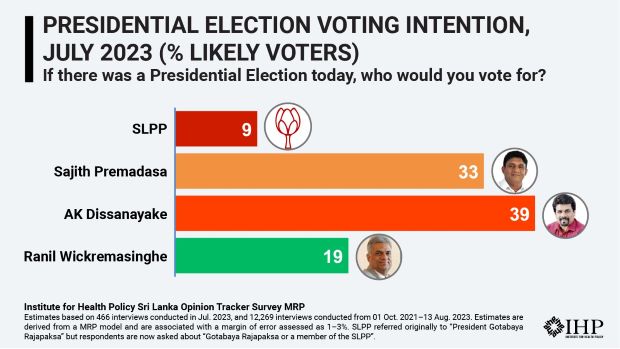COLOMBO – An opinion poll for July for presidential election voting intent showed that Sri Lanka President Ranil Wickremesinghe has seen a steady rise in support though he is still behind opposition figures Anura Kumara Dissanayake and Sajith Premadasa.
A Sri Lanka Opinion Tracker Survey (SLOTS) polling by the Institute for Health Policy (IHP) for July 2023 showed support for Wickremsinghe rising to 19% of likely voters, but he remains well behind leftist National People’s Power (NPP) leader Dissanayake and opposition and Samagi Jana Balawegaya (SJB) leader Sajith Premadasa at 39 and 33% respectively.
The IHP said in a statement that estimates are associated with a margin of error of 1 to 4%.
The trends in July largely maintain the pattern from previous months, but the latest data more strongly supports the recent up trend in support for President Wickremesinghe. They also suggest that recent gains in his support have been at the expense of SJB leader Sajith Premadasa, the IHP said.
A separate IHP survey for July showed a general decline for two major opposition parties and modest increases for the ruling party and the president’s party, though the largest share of likely voters remained unwilling to name a party they would support.
SLOTS combines interviews from a national sample of adults (ages 18 and over) reached by random digit dialling of mobile numbers, and others coming from a national panel of respondents who were previously recruited through random selection. IHP estimates voting intent using an adaptation of MRP, with multiple imputation to account for uncertainties in its modelling, exploiting data from all SLOTS interviews to estimate voting in a particular month, the institute said explaining its methodology.
The July 2023 MRP estimates are based on 466 interviews conducted in July 2023, and 12,269 interviews conducted overall from October 1, 2021 – August 13, 2023, with a margin of error assessed as 3–5% for the NPP/JVP, SJB, UNP and the SLPP, and 1–3 percent for the other parties. As the May update uses a more recent data set than the previous update, there are small changes in estimates of voting shares for previous months. A total of 62 stochastic simulations were used in the modelling to estimate margins of error, the IHP said.
MRP is a method that is increasingly used by polling firms in other countries to leverage small samples, most notably by YouGov which used it to forecast results of the UK Brexit Referendum and recent UK general elections. All estimates are adjusted to ensure the sample matches the national population with respect to age, sex, ethnicity, socioeconomic status, education, geographical location, and voting in the 2019 Presidential and 2020 General Elections, the IHP said.
The SLOTS has been funded by the Neelan Tiruchelvam Trust, the UK National Institute for Health and Care Research (NIHR), The Asia Foundation in Sri Lanka, and others, the institute said.
-economynext.com



Comments are closed, but trackbacks and pingbacks are open.